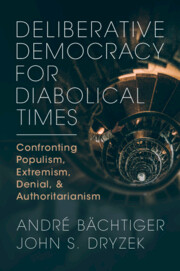 Deliberative Democracy for Diabolical Times
Deliberative Democracy for Diabolical Times Book contents
- Deliberative Democracy for Diabolical Times
- Deliberative Democracy for Diabolical Times
- Copyright page
- Contents
- Preface
- 1 An Introduction for Diabolical Times
- 2 Deliberation for Realists and Skeptics
- 3 Democracy in a Diabolical Soundscape
- 4 How to Deliberate with (and against) Populists
- 5 How to Deliberate with (and against) Extremists
- 6 How to Deliberate with (and against) Deniers
- 7 How to Deliberate with (and against) Authoritarians
- 8 How to Deliberate with Everybody
- 9 How to Renew a Deliberative Democracy
- References
- Index
7 - How to Deliberate with (and against) Authoritarians
Published online by Cambridge University Press: 28 March 2024
- Deliberative Democracy for Diabolical Times
- Deliberative Democracy for Diabolical Times
- Copyright page
- Contents
- Preface
- 1 An Introduction for Diabolical Times
- 2 Deliberation for Realists and Skeptics
- 3 Democracy in a Diabolical Soundscape
- 4 How to Deliberate with (and against) Populists
- 5 How to Deliberate with (and against) Extremists
- 6 How to Deliberate with (and against) Deniers
- 7 How to Deliberate with (and against) Authoritarians
- 8 How to Deliberate with Everybody
- 9 How to Renew a Deliberative Democracy
- References
- Index
Summary
Since the rise of states and empires, most people have lived under authoritarian regimes, and authoritarianism has made a comeback after a brief few decades in which liberal democracy looked like it was on the road to dominating the global stage. However, while still existing in some countries, the straightforwardly coercive authoritarian style has become hard to sustain. The new authoritarianism is more subtle in how it secures power, using seemingly democratic devices, including deliberative ones. Authoritarian devices are increasingly deployed by leaders in nominally democratic states. Authoritarianism is also a problem for democracy if it is embodied in the political attitudes held by significant numbers of citizens, including in states that remain democracies. Chapter 7 develops responses to the old authoritarianism, the new state authoritarianism (paying special attention to China), creeping authoritarianism in democratic states (such as the United States, Poland, and Hungary), and authoritarian attitudes. Contestatory public deliberation enters in different ways in the first three of these contexts, but cultivation of a democratic public sphere to resist authoritarians is always important. Drawing on discursive psychology, people with authoritarian attitudes may be drawn into deliberative engagement given that such people may have access to both authoritarian and democratic discourses.
Keywords
- Type
- Chapter
- Information
- Deliberative Democracy for Diabolical TimesConfronting Populism, Extremism, Denial, and Authoritarianism, pp. 147 - 167Publisher: Cambridge University PressPrint publication year: 2024
